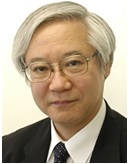
Plenary Lecture
Impact of Electron Device Miniaturization on Computing and World After the End of Miniaturization

Professor Hiroshi Iwai
Tokyo Institute of Technology
Japan
E-mail: iwai.h.aa@m.titech.ac.jp
Abstract: The downsizing of electron devices has always been the key to promote the computer performance and energy consumption for the past 70 years since its beginning. However, it should be noted now that the downsizing of the electron devices cannot continue forever, and expected to reach its limit about 10 years from now. Thus, no big progress expected in the microprocessor level any more, but the rapid growth of IoT technologies will connect many different kind of devices, resulting in the significant enhancement of the processing abilities in our society. Also, AI constructed on the semiconductor computer will become much wiser than human brain in specific purpose, helping our society promote to higher stage. However, AI on the semiconductor computer will not compete at all the existing bio system comprehensively in terms of energy consumption. Thus, in a long term, we will have to consider to use the existing bio systems as much as we can with combination of AI constructed on the semiconductor devices.
Brief Biography of the Speaker: Hiroshi Iwai received the B.E. and Ph.D. degrees in electrical engineering from the University of Tokyo and worked in the research and development of integrated circuit technology for 26 years from 1973 in Toshiba and 18 years since 1999 in Tokyo Institute of Technology. He is now a Professor Emeritus, Tokyo Institute of Technology, Honorary Professor, Institute of Microelectronics, Chinese Academy of Science, Vice Dean and Distinguished Chair Professor, National Chiao Tung University, D. J. Gandhi Distinguished Visiting Professor, Indian Institute of Technology. Since joining Toshiba, he has developed several generations of high density static RAM's, dynamic RAM's and logic LSI's including CMOS, bipolar, and Bi-CMOS devices. He has also been engaged in research on device physics for nanaelectronics, process technologies, and T-CAD related to small-geometry MOSFETs, high speed bipolar transistors, Si and GaN power devices. He has authored and coauthored more than 1000 international journal and conference papers and more than 500 domestic those papers. He has served on many committees of conferences and editors of journals, as well as a member of many evaluation committee of public organizations. For example, the President of the IEEE EDS, the Director of IEEE Division I, a member of IEEE Board, an editor of IEEE EDS Newsletter, a guest editor of IEEE Trans. on Electron Devices, and an editor of the Proceedings of many ECS Symposia. His awards include; Nagoya City Major Award (1968), Local Commendation for Invention from Japan Institute of Invention and Innovation (1990, 2005), Grand Prize of Nikkei BP Technology Awards (1994), IEEE EDS Paul Rappaport Award (1994), IEICE ES Electronics Award (1998), IEEE EDS J.J.Ebers Award (2001), and JSAP Award for the best paper (2002), IEEE BCTM Award (2007), Yamazaki-Teiichi Prize (2007), IEEE 2008 EDS Distinguished Service Award (2008), The Commendation for Science and Technology by the Minister of Education, Culture, Science and Technology, Prizes for Science and Technology, Development Category Award (2009), IEEE IWJT IWAI Award (2014), IEEE Cledo Brunetti Award (2015), IEEE EDS Education Award (2016). Dr. Iwai is, a life fellow of IEEE, a fellow of Institute of Electrical Engineers of Japan, a fellow of the Japan Society Applied Physics, and a fellow of the Institute of Electronics, Information and Communication Engineers.